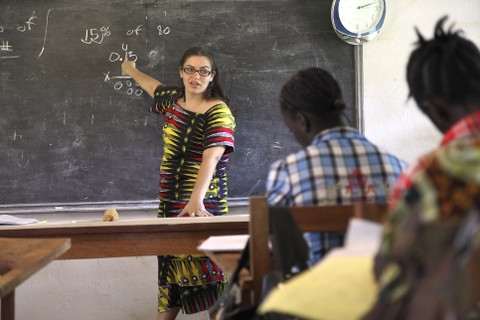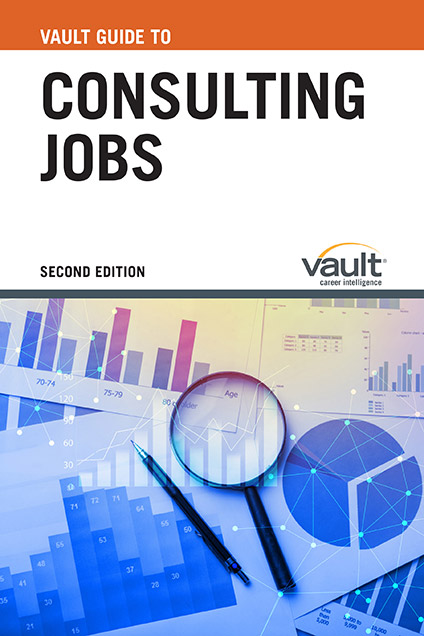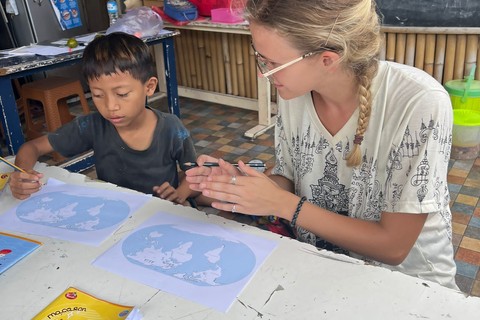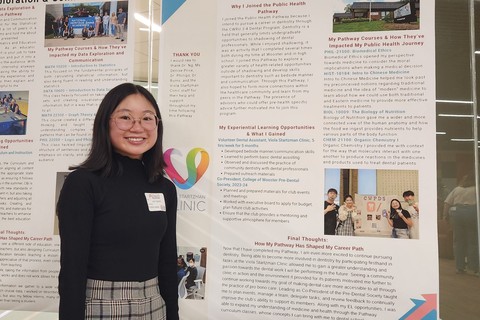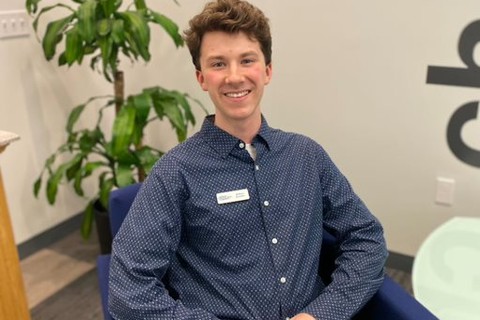

Global Impacts Pathway
The world today faces pervasive challenges and presents promising opportunities. If you are passionate about global engagement, this Pathway offers you the practical experiences and skills for making a difference in the world.
The Global Impacts Pathway is designed for students interested in careers that seek to address international challenges, particularly in the areas of education, healthcare, and the environment, and especially in the developing world. This Pathway emphasizes service, experiential learning, and personal reflection and discovery, while offering an adaptable curricular structure. Students following this Pathway build connections with Wooster faculty, staff, and alumni who are committed to international development, exchange, and understanding.
Students who choose this Pathway will develop knowledge and skills in these areas:
- Engagement with a world language
- Academic training in a particular sector: education, health, or the environment
- Intercultural understanding and competence
- Service work
- International experience
- Leadership
Students in this Pathway might consider careers in:
- International service
- Economic development
- NGOs and INGOs
- International education
- And more
Whether you’ve traveled the world widely and moved between cultures or have yet to study abroad, if you are looking forward to addressing important problems in an international context, this Pathway will help you cultivate the skills to succeed.
Students participating in the Global Impacts Pathway may elect to complete the College’s official Peace Corps Prep program. This requires only a few additional steps. This program can help students to successfully compete for admission into the Peace Corps after graduation. To earn a Peace Corps Prep certificate, students need to complete the requirements for the Global Impacts Pathway and then:
- Complete the PCP application (which is essentially a plan. Students won’t be declined entrance into the program). Be sure to use this comprehensive application guide.
- Complete an additional (third) course in your chosen work sector. You may choose an additional course from the Global Impacts list for that work sector or request permission to count another course you believe fits. Speak to your assigned Global Impacts team member or the Peace Corps Prep Coordinator about any requests for substitutions.
- Work with APEX to prepare a CV specifically targeted for service in the Peace Corps.
- Attend a workshop or class on interview skills offered through Career Planning in APEX. Complete a practice interview either with Career Planning or a Peace Corps Recruiter (recommended if applying to be a Peace Corps Volunteer).
- Complete the PCP Exit Checkist.
Please review the resources found here as you make your decision and plan your Peace Corps Prep experience.
* The Peace Corps actively recruits speakers of French and Spanish, since these languages are spoken in many Peace Corps host countries. Students hoping to serve in a Spanish-speaking country should have strong intermediate proficiency in Spanish (two semesters at the 200 level).
* The Peace Corps values study abroad experiences, and especially those in developing countries.
Take four (4) courses fitting the following descriptions.
Engagement with a World Language
1 Course
Students must complete at least one course at the intermediate level. Students who placed at the advanced level when they took the placement test may complete this requirement by taking a course at the advanced level. Additional courses are encouraged. Students may complete this requirement on campus or while abroad. International students whose first language is not English may opt out of this pathway requirement. Students may choose to study other world languages, not offered at Wooster, during the summer or while abroad. Online courses are not accepted.
- CHIN-20100: Intermediate Chinese Level I*
- CHIN-20200: Intermediate Chinese Level II*
- FREN-20100: French Conversation*
- FREN-20300: French Composition*
- GRMN-20100: Intermediate German Level I*
- GRMN-20200: Intermediate German Level II*
- RUSS-20100: Intermediate Russian Level I*
- RUSS-20200: Intermediate Russian Level II*
- SPAN-20100: Intermediate Spanish for Grammar, Conversation & Composition I*
- SPAN-20200: Intermediate Spanish for Grammar, Conversation & Composition II*
Intercultural Understanding and Competence
1 Course
Addressing global challenges requires dedication to intercultural understanding and competence. Courses approved for this requirement must include direct and sustained engagement with intercultural questions and learning; conceptual and theoretical components relating to cultural relations, exchanges, and dynamics; and a comparative, trans-national, or trans-continental focus. This requirement must be completed on campus.
- AFST-10000: Introduction to Africana Studies
- AFST-21300: Racism 101
- COMM-22700: Intercultural Communication*
- FREN-22406: Mediterranean Crossings: North Africa & France*
- FREN-33500: West Africa & France: Encounters since 1900*
- GMDS-21200: Cultural Studies & Power*
- HIST-10176: History of Islam
- HIST-10165: West Africa & Black America
- IDPT-19910: Global Engagement Seminar
- RELS-21900: Ethics in a Social Perspective
- SOCI-21400: Racial & Ethnic Groups in American Society
- SOCI-21900: Globalization & Contemporary China*
- WGSS-19901: Race, Gender & Tourism
- WGSS-20400: Transnational Feminisms*
- WGSS-20600: Queer Lives*
Academic Training in a Specific Work Sector
2 courses (3 if Peace Corps Prep)
Courses may be completed on campus, over the summer, or while abroad. The work sectors are as defined by the Peace Corps, but students may reimagine them to meet other interests related to international work. If you’d like to count a course that is not listed here (including study abroad courses), please email your assigned Global Impacts team member to discuss the option of using it.
Education
Approved coursework in the education sector encourages students to examine the historical, sociological, and philosophical foundations of educational institutions and policies through the lenses of nationality, race, ethnicity, gender, sexuality, and social class. They also provide some preparation for participate in international education.
- ANTH 22000: Linguistic Anthropology*
- EDUC 10000: Intro to Education
- EDUC 11500: Child and Adolescent Development
- EDUC 16000: Fundamentals of Environmental Education
- EDUC 17000: Intro to Intervention and Student Support
- EDUC 19905: Teaching Globally Engaged Learners
- EDUC 23100: Introduction to Early Childhood and Elementary Education*
- EDUC 25100: Intro to Adolescent and Young Adult Education*
- EDUC 30000: Classroom Management as Social Justice*
Health
Coursework in the global health sector has students consider cross-cultural perspectives on health-related issues such as reproduction, nutrition, infectious disease, economics, medicine, and the experience of pain. Approved courses in this sector may also allow students to study local and global responses to these issues, as well as inequities based on race, nationality, class, age, gender, or sexuality.
- ANTH 29901: Global Politics of Reproduction*
- BIOL 10009: Biology of Nutrition
- BIOL 10010: Science of Outbreaks: The Past, Present and Future of Infectious Disease
- ECON 26800: Health Economics*
- HIST 20135: History of Pain
- SOAN 20201: Globalizing Health*
- SOCI 29908: Sociology of Medicine*
Environment
Coursework in the environment sector may introduce students to theories & methods of conservation and sustainability; economic, social, and political influences on environmental decision-making; and/or perspectives on humanity’s relationship with the environment.
- BIOL 35600: Conservation Biology*
- BIOL 35000: Populations & Community Ecology*
- CHEM 21600: Environmental Chemistry*
- COMM 26000: Environmental Communication*
- ECON 24000: Environmental and Natural Resource Economics*
- ECON 29906: Economic Topics in Environmental Justice*
- EDUC 16000: Fundamentals of Environmental Education
- ENTR 22000: Entrepreneurship & Societal Impact
- ENVS 10100: Intro to Environmental Studies
- ENVS 15000: Introduction to Environmental Policy
- ENVS 16000: Science of Environmental Issues
- ENVS 21000: Rural Society & the Environment
- ENVS 23000: Sustainable Agriculture: Theory & Practice
- ENVS 24000: Environmental Innovations
- ENVS 27000: Science of Agroecology
- ENVS 30003: Sustainability
- ESCI 10500: Geology of Natural Hazards
- ESCI 11000: Environmental Geology
- ESCI 27500: Modern Climate Change*
- PHIL 21600: Environmental Ethics
- PHYS 19901: Environmental Physics
- PSYC 22500: Environmental Psychology*
- RELS 26911: Religion and Ecology
- SOCI 20300: Environmental Sociology*
*Course has pre-requisite or requires instructor permission to register
PATH 11005: Initial Reflection
This course asks you to complete three basic steps:
- Spend time reflecting on several questions about why you’ve chosen this Pathway.
- Discuss your thoughts with other Activism students, faculty, and staff.
- Write about how your initial thoughts, the conversations you had with your Pathway community, and any new or different insights you have as a result.
PATH 22005: Career Planning
For this course, you will explore career and internship resources offered through Career Planning in APEX, specifically Handshake and Fighting Scots Career Connections. You will also craft a career-ready resume. We strongly encourage you to take advantage of the many resources offered by the Career Planning office to bring your resume to a truly professional level. Booking an appointment with a Career Planning staff member or peer advisor to go over your resume is strongly recommended.
PATH 33005: Experiential Learning
This course asks you to complete an authentic, hands-on experience in one of the career areas you’re exploring. It is more than simply having an experience, however. In order to maximize the benefits and learning you gain, you will deliberately walk through goal setting, planning, and “preflection” (pre-reflection) before you complete the career experience. During and after your experience, you will spend time considering what you learned about yourself from the experience and how those lessons might impact your next career steps. Completing this thorough, guided process is what makes this “experiential learning” rather than just an experience.
**Note that this course will require you to complete some components BEFORE registering**
Steps to complete PATH 330:
Before Registering:
- Explore a range of possible experiences that will help you further your career goals.
- Plan your EL experience, taking advantage of resources and assistance offered by faculty or staff on the Pathway team, someone from APEX’s Experiential Learning & Community Engagement Office, Wooster alumni working in the career field, and/or your own connections in the field.
- Complete the EL Approval Form & gain official approval from your Pathway faculty/staff team.
During the Course:
- Complete your EL experience (can be done before or during PATH 330).
- Upload your EL Verification Form.
- Submit your post-EL reflection.
PATH 44005: Final Reflection
When you’ve completed all the elements of the Pathway – PATH 110, 220, 330 and your chosen topical courses – you will reflect on your total Pathways experience with questions like: What did the topical courses teach you that are relevant to this career area? What are the career lessons from your experiential learning experience(s)? How did your perceptions of this career area and your place in it shift over time and where have they landed for now? When you step back and look at the bigger picture of your Pathways experience, in what ways are you stronger and more prepared to take your next career steps?
You will present your reflections publicly, which both encourages significant reflection and benefits those who are coming behind you on their own career journeys. Generally, students will do this by presenting a poster at a college event. You will also need to update your resume with all your Pathway experiences and create or update your LinkedIn profile.
Students in the Global Impacts Pathway are required to complete three (3) EL opportunities.
Study Abroad
Students are encouraged to seek out immersive study abroad programs with practical components, such as hands-on projects, internships, community-based learning, independent research projects, etc.
When possible, please consider taking courses taught in languages other than English, to deepen your competency in a world language. We encourage students following this Pathway to give special consideration to study abroad programs in developing countries.
If a full semester is not an option, Wooster offers short-term faculty-led programs called TREKs. These vary in theme and location each year. In rare cases, students may be granted exceptions to the study abroad requirement.
Volunteering
Student’s need to volunteer in one’s chosen work sector for at least 50 hours. This may be completed on campus and/or while abroad. Additional volunteering or service in other areas is encouraged.
General examples:
- Religious & Spritual Life Service Trip during Spring Break to Tijuana or Colcord, WV
- International Student Orientation Committee member (this requires a semester of training in addition to summer camp; fall experience with new international students
- Residence Hall Assistant (RA) with international student residents (this requires year-long experience and training)
- Intercultural Partnership Program (IPP) through International Student Services
- Student intern in International Student Services office
- World language tutor
- Sophomore research assistant
Education examples:
- Member of International Education Week Committee
- Tutoring at Boys and Girls Club at Edgewood Middle School
- Participating in COW4Kids service organization
- Participating in Montessori Volunteer Program
- Joining Cornerstone PlayLab Volunteer Program
- Joining Wooster Future Educators Association (WFEA)
- Education internships through APEX Fellowship program
Health examples:
- Volunteering with Central American Medical Outreach (CAMO) in Orrville, OH
- Volunteering at the Viola Starzman Clinic in Wooster, OH
- Health internships through APEX Fellowship program
- Health Coach program through APEX
Environment examples:
- Serving on the College’s Sustainability Committee
- Joining Greenhouse, Wooster’s student-run environmental organization
- Joining the Friends of Wooster’s Memorial Park
- Volunteering with the College’s Carbon Capture project at Fern Valley
- Volunteering with the Wooster “Salamander Squad”
- Engaging with the Wayne County Sustainable Energy Network
- Environmental internships through APEX Fellowship program
Leadership Experience
May be completed on campus, over the summer, or while abroad
Examples include:
- Taking on leadership role in program house or world language/culture suite in Luce Hall
- Participating in student government
- Serving as leader on the International Student Orientation Committee
- Pursuing leadership opportunities through the Center for Diversity & Inclusion
Planning your EL:
- Read through the EL Approval Form and any other EL guidelines provided by your Pathway.
- Develop an idea about the type of experience you’d like to do and when you’d like to do it. Find experiences that might work for you. Some ways to do this:
- Look at internship organizations and listings on this website.
- Search Handshake and other job posting sites
- Ask other students, faculty, and staff in your Pathway for ideas
- Meet with someone from the Experiential Learning & Community Engagement Office in APEX to talk through ideas that fit your specific goals (and possible funding opportunities)
- Meet with the Pathways Program Coordinator or your Pathway’s Peer Advisor to discuss ideas
- Create a list of the most exciting 2 or 3 opportunities you’ve found
- Meet with someone from your Pathway’s faculty/staff team to choose one and get unofficial approval for the experience
- Apply for the experience.
- Once you’ve been accepted, review the EL Approval Form again and carefully collect all the required information.
- Fill out and submit your EL Approval Form.
- Once you’ve gotten approval for your EL, you can register for PATH 330.
Important EL Forms:
EL Approval Form: complete after planning your EL, before doing the EL. Submit through MS Forms.
EL Verification Form: done by you and your EL supervisor at the end of your EL. Submit as part of PATH 330 work.
Required Training
- Nothing else is currently required for the Pathway














